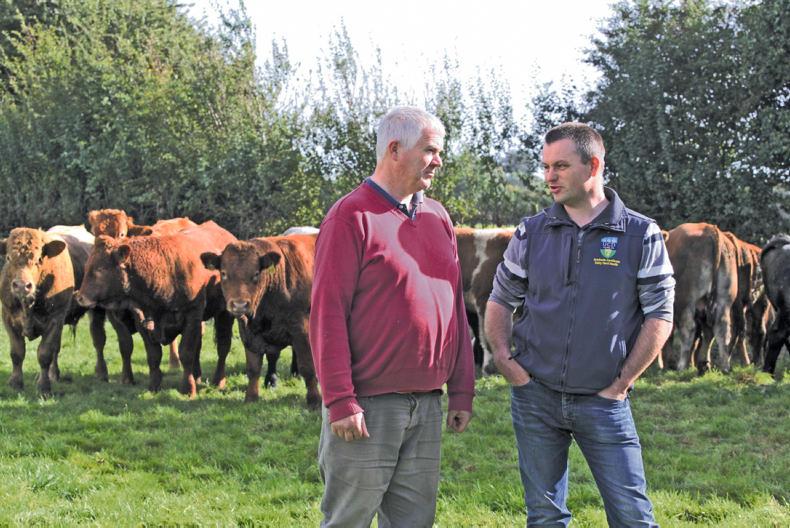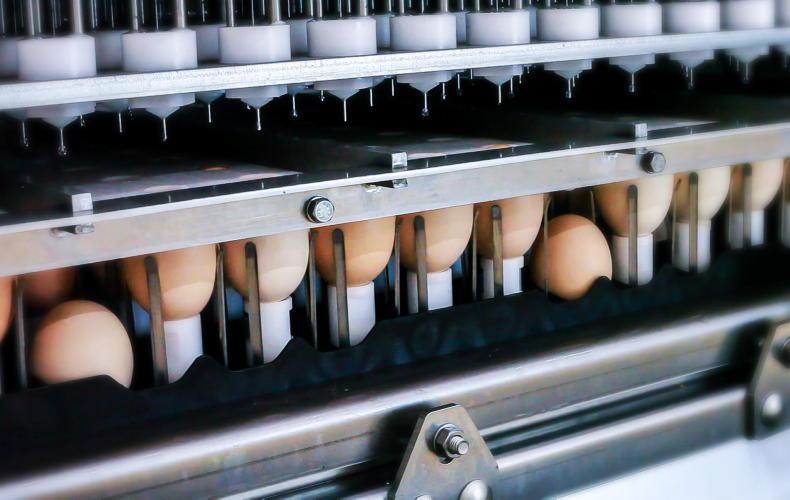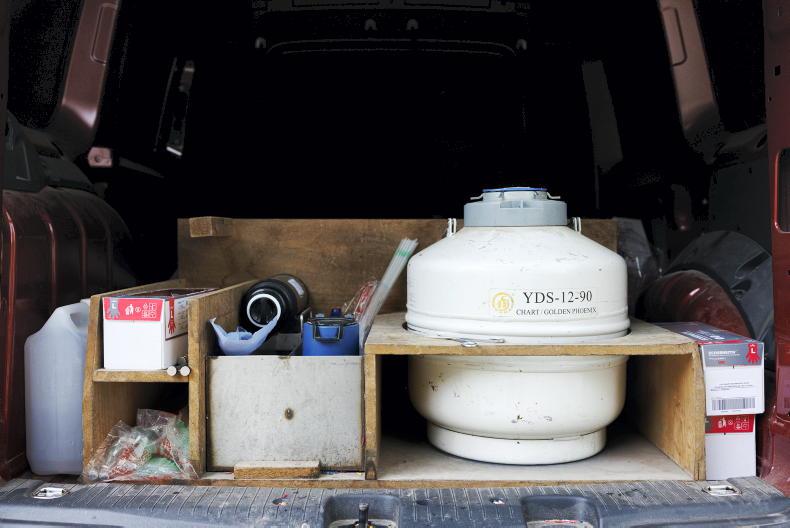Kieran, who farms at Leabeg in the parish of Ferbane, specialises in the intensive finishing of bulls and heifers.
As he was housing a bunch of bulls in autumn 2015, he noticed a few of them had skin lesions. Within a matter of weeks, the lesions had spread rapidly and the number of animals affected had increased. The animals were infected with ringworm.
“They had it all over their bodies. A couple of the worst of them had more ringworm than hair,” he said.
His veterinary practitioner Donal Lynch advised him to use the ringworm vaccine. Both Kieran and Donal agree that the response was dramatic. The ringworm began to clear up after around a week.
Infectious
“Many farmers think that, because of its name, ringworm is caused by some kind of worm or parasite. It is actually a spore-forming fungal disease which is highly infectious.
“Over 95% of ringworm cases are caused by the fungus Trichophyton verrucosum. The fungal spores can survive for years in a dry environment. Spread is mainly from infected animals. Carrier animals, timber and equipment also spread infection.
“Ringworm will usually resolve as the animal develops immunity, but the course of the disease can last two to three months, during which an infected animal can spread infection,” said Donal Lynch.
Incidence
He said the disease tends to be more pronounced in calves. From his own experience, bucket-reared calves seem to be more prone to infection. Infection in calves is most commonly found around the eyes, ears and back. In adult cattle, the chest and legs are more likely to be infected.
There are no actual figures for the level of ringworm infection in Ireland. It occurs in around 10% of cattle across Europe. Based on his own experience and that of his colleagues in XLVets, which represents 24 veterinary practices in Ireland, Donal feels that the level of infection in Irish cattle is similar to the European average.
“In our own practice here, we have noticed an increase in the number of cases over the past year or so. It can occur in cattle both indoors and outdoors. As well as making infected cattle unsaleable and reducing the value of the hide, it is highly irritable and discomforting. If an animal is not comfortable, it is not going to thrive,” he said.
Advice
 Where ringworm is diagnosed, he advises his clients to vaccinate all affected and in-contact animals as well as operating strict hygiene practices. He urged farmers to contact their vet as soon as the first signs of ringworm are noticed.
Where ringworm is diagnosed, he advises his clients to vaccinate all affected and in-contact animals as well as operating strict hygiene practices. He urged farmers to contact their vet as soon as the first signs of ringworm are noticed.
He said horses, dogs and cats are also susceptible. Farmers and their families are at high risk of picking up infection from any of these farm animal or pet sources.
The predominant fungal strains affecting animals can also infect humans, leading to serious and irritable skin infection. Young people and people with compromised immunity are particularly susceptible. Donal Lynch urged strict hygiene standards when dealing with animals suffering from ringworm.
High performance from healthy animals

Kieran Dooley places huge emphasis on animal health in achieving maximum animal performance. In this regard, protection against respiratory diseases is a critical component of his animal health programme, which is regularly monitored and updated by his vet Donal Lynch.
An increasing proportion of stock purchases are directly from suckler herds. He is convinced that buying direct from farms leads to more contented stock which are less prone to respiratory infection.
“We have a very strict vaccination regime for all bought-in stock. Where the animals are bought directly from a farm, they get a shot of Bovipast® RSP before they leave the farm. They are also given Bovilis® IBR Marker Live.
“Animals that are bought in marts are vaccinated with Bovipast® RSP and Bovilis® IBR Marker Live as soon as possible after they arrive here on the farm,” said Kieran.
Bovipast® RSP provides broad protection against pasteurella pneumonia (caused by the bacteria Mannheimia haemolytica) as well as the two main viruses, BRS-Virus (Bovine Respiratory Syncytial virus) and PI-3 virus (Parainfluenza 3 virus).
Bovilis® IBR Marker Live protects against IBR (Infectious Bovine Rhinotracheitis). Recent research has shown that almost three-quarters of all suckler and dairy herds are positive to the IBR virus.
All bought-in animals are generally let out to grass for around four weeks after arriving on the farm. This makes for healthier, more contented stock. They are given their booster shot of Bovipast® RSP when they are being housed.
Low carbon emissions award
 Kieran Dooley was one of the award winners in the 2016 Bord Bia Origin Green Sustainable Beef and Dairy Producer Awards. He took the top award in the weanling/store-to-beef category.
Kieran Dooley was one of the award winners in the 2016 Bord Bia Origin Green Sustainable Beef and Dairy Producer Awards. He took the top award in the weanling/store-to-beef category.
He was one of 12 beef finalists selected from the 46,500 cattle farmers who are certified members of Bord Bia’s Beef and Lamb Quality Assurance Schemes. He and his fellow finalists are producing beef with a 30-40% lower carbon footprint than the average for all beef producers.
His award is confirmation of the high levels of efficiency that Kieran is achieving across all areas of his business. Finishing bulls consistently achieve average gains of 2kg/day on a diet that includes maize silage, fodder beet, cereals and potato byproduct. Cattle stand on a slatted area to feed and they have a lie-back bedded area. This makes for exceptionally clean animals.
Cattle are purchased throughout the year. His aim is to acquire as many strong bulls as possible, with good weight-for-age, that have the capacity to finish at under 16 months. Lighter animals are put on grass for the bulk of the grazing season and are finished at under 20 months.
Bovilis Bovipast RSP contains inact. BRS Virus strain EV908, inact. Pi-3-Virus, strain SF-4 Reisinger and inact. Mannheimia haemolytica A1, strain M4/1.
Bovilis IBR Marker Live contains live, attenuated IBR marker vaccine BHV-1 strain GK/D (gE¯). For the active immunisation against infectious bovine rhinotracheitis virus.
Use medicines responsibly
Withdrawal periods: zero days. Legal Categories: ROI POM(E) NI POM-V.
For further information see SPC, Contact prescriber or MSD Animal Health, Red Oak North, South County Business Park, Leopardstown, Dublin 18, Ireland. Tel: +353(0)1 2970220. E-mail: vet-support.ie@merck.com Web: www.msd-animal-health.ie
Kieran, who farms at Leabeg in the parish of Ferbane, specialises in the intensive finishing of bulls and heifers.
As he was housing a bunch of bulls in autumn 2015, he noticed a few of them had skin lesions. Within a matter of weeks, the lesions had spread rapidly and the number of animals affected had increased. The animals were infected with ringworm.
“They had it all over their bodies. A couple of the worst of them had more ringworm than hair,” he said.
His veterinary practitioner Donal Lynch advised him to use the ringworm vaccine. Both Kieran and Donal agree that the response was dramatic. The ringworm began to clear up after around a week.
Infectious
“Many farmers think that, because of its name, ringworm is caused by some kind of worm or parasite. It is actually a spore-forming fungal disease which is highly infectious.
“Over 95% of ringworm cases are caused by the fungus Trichophyton verrucosum. The fungal spores can survive for years in a dry environment. Spread is mainly from infected animals. Carrier animals, timber and equipment also spread infection.
“Ringworm will usually resolve as the animal develops immunity, but the course of the disease can last two to three months, during which an infected animal can spread infection,” said Donal Lynch.
Incidence
He said the disease tends to be more pronounced in calves. From his own experience, bucket-reared calves seem to be more prone to infection. Infection in calves is most commonly found around the eyes, ears and back. In adult cattle, the chest and legs are more likely to be infected.
There are no actual figures for the level of ringworm infection in Ireland. It occurs in around 10% of cattle across Europe. Based on his own experience and that of his colleagues in XLVets, which represents 24 veterinary practices in Ireland, Donal feels that the level of infection in Irish cattle is similar to the European average.
“In our own practice here, we have noticed an increase in the number of cases over the past year or so. It can occur in cattle both indoors and outdoors. As well as making infected cattle unsaleable and reducing the value of the hide, it is highly irritable and discomforting. If an animal is not comfortable, it is not going to thrive,” he said.
Advice
 Where ringworm is diagnosed, he advises his clients to vaccinate all affected and in-contact animals as well as operating strict hygiene practices. He urged farmers to contact their vet as soon as the first signs of ringworm are noticed.
Where ringworm is diagnosed, he advises his clients to vaccinate all affected and in-contact animals as well as operating strict hygiene practices. He urged farmers to contact their vet as soon as the first signs of ringworm are noticed.
He said horses, dogs and cats are also susceptible. Farmers and their families are at high risk of picking up infection from any of these farm animal or pet sources.
The predominant fungal strains affecting animals can also infect humans, leading to serious and irritable skin infection. Young people and people with compromised immunity are particularly susceptible. Donal Lynch urged strict hygiene standards when dealing with animals suffering from ringworm.
High performance from healthy animals

Kieran Dooley places huge emphasis on animal health in achieving maximum animal performance. In this regard, protection against respiratory diseases is a critical component of his animal health programme, which is regularly monitored and updated by his vet Donal Lynch.
An increasing proportion of stock purchases are directly from suckler herds. He is convinced that buying direct from farms leads to more contented stock which are less prone to respiratory infection.
“We have a very strict vaccination regime for all bought-in stock. Where the animals are bought directly from a farm, they get a shot of Bovipast® RSP before they leave the farm. They are also given Bovilis® IBR Marker Live.
“Animals that are bought in marts are vaccinated with Bovipast® RSP and Bovilis® IBR Marker Live as soon as possible after they arrive here on the farm,” said Kieran.
Bovipast® RSP provides broad protection against pasteurella pneumonia (caused by the bacteria Mannheimia haemolytica) as well as the two main viruses, BRS-Virus (Bovine Respiratory Syncytial virus) and PI-3 virus (Parainfluenza 3 virus).
Bovilis® IBR Marker Live protects against IBR (Infectious Bovine Rhinotracheitis). Recent research has shown that almost three-quarters of all suckler and dairy herds are positive to the IBR virus.
All bought-in animals are generally let out to grass for around four weeks after arriving on the farm. This makes for healthier, more contented stock. They are given their booster shot of Bovipast® RSP when they are being housed.
Low carbon emissions award
 Kieran Dooley was one of the award winners in the 2016 Bord Bia Origin Green Sustainable Beef and Dairy Producer Awards. He took the top award in the weanling/store-to-beef category.
Kieran Dooley was one of the award winners in the 2016 Bord Bia Origin Green Sustainable Beef and Dairy Producer Awards. He took the top award in the weanling/store-to-beef category.
He was one of 12 beef finalists selected from the 46,500 cattle farmers who are certified members of Bord Bia’s Beef and Lamb Quality Assurance Schemes. He and his fellow finalists are producing beef with a 30-40% lower carbon footprint than the average for all beef producers.
His award is confirmation of the high levels of efficiency that Kieran is achieving across all areas of his business. Finishing bulls consistently achieve average gains of 2kg/day on a diet that includes maize silage, fodder beet, cereals and potato byproduct. Cattle stand on a slatted area to feed and they have a lie-back bedded area. This makes for exceptionally clean animals.
Cattle are purchased throughout the year. His aim is to acquire as many strong bulls as possible, with good weight-for-age, that have the capacity to finish at under 16 months. Lighter animals are put on grass for the bulk of the grazing season and are finished at under 20 months.
Bovilis Bovipast RSP contains inact. BRS Virus strain EV908, inact. Pi-3-Virus, strain SF-4 Reisinger and inact. Mannheimia haemolytica A1, strain M4/1.
Bovilis IBR Marker Live contains live, attenuated IBR marker vaccine BHV-1 strain GK/D (gE¯). For the active immunisation against infectious bovine rhinotracheitis virus.
Use medicines responsibly
Withdrawal periods: zero days. Legal Categories: ROI POM(E) NI POM-V.
For further information see SPC, Contact prescriber or MSD Animal Health, Red Oak North, South County Business Park, Leopardstown, Dublin 18, Ireland. Tel: +353(0)1 2970220. E-mail: vet-support.ie@merck.com Web: www.msd-animal-health.ie
 Where ringworm is diagnosed, he advises his clients to vaccinate all affected and in-contact animals as well as operating strict hygiene practices. He urged farmers to contact their vet as soon as the first signs of ringworm are noticed.
Where ringworm is diagnosed, he advises his clients to vaccinate all affected and in-contact animals as well as operating strict hygiene practices. He urged farmers to contact their vet as soon as the first signs of ringworm are noticed. 
 Kieran Dooley was one of the award winners in the 2016 Bord Bia Origin Green Sustainable Beef and Dairy Producer Awards. He took the top award in the weanling/store-to-beef category.
Kieran Dooley was one of the award winners in the 2016 Bord Bia Origin Green Sustainable Beef and Dairy Producer Awards. He took the top award in the weanling/store-to-beef category. 









SHARING OPTIONS